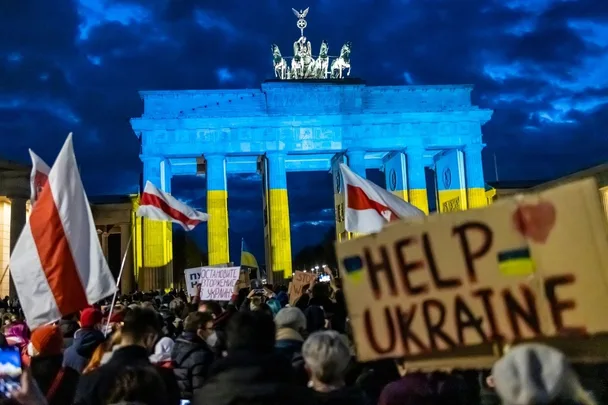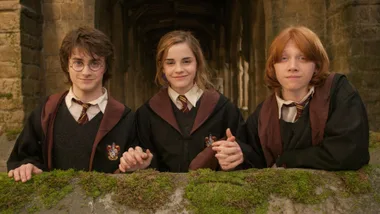Vladimir Putin has officially announced war with Ukraine, as mounting conflict has resulted in a full-scale military takeover. Despite the nations efforts to resolve the tension amicably, Putin has pressed forward with an invasion in an attempt to regain control of Ukranian land.
Now, multiple world leaders are hosting crisis talks and imposing sanctions on Russia in an attempt to de-escalate the tension. The United States and United Kingdom have already imposed several sanctions, and have offered military aid to Ukraine. The question many Australians have is, are we going to get involved?
Below, everything you need to know about the conflict between Russia and Ukraine, including how we can help.
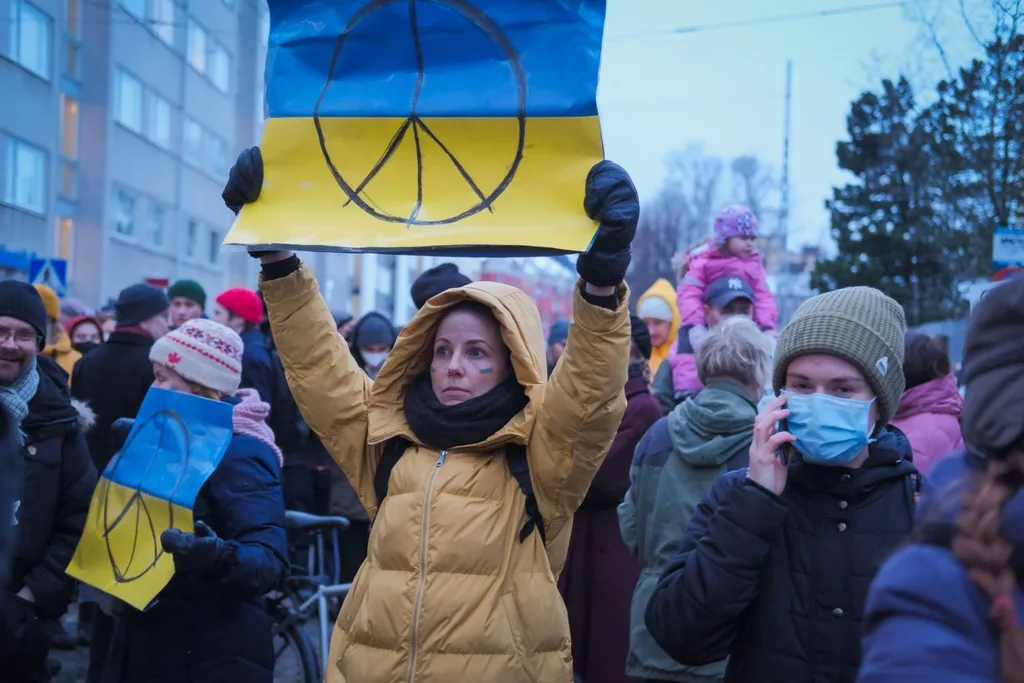
How has Australia responded to the conflict?
The biggest question on everyone’s minds right now is, will Australia be sending troops? As it currently stands, the federal government (including PM Scott Morrison, Foreign Minister Marise Payne and Defence Minister Peter Dutton) have ruled out the possibility of military action in Ukraine.
“We can provide what support we can but we’ve been very clear the Australian government won’t provide troops on the ground,” Dutton said earlier this week, per The Guardian.
Morrison also claimed that Australia will be helping Ukraine out in ‘other ways’ but did not go into specifics on what that could entail. He then said we would work with our allies ‘in partnership’ on the matter.
Australia is currently helping Ukraine with cyber security, after Russia had been blamed for a series of attacks on Ukraine’s major banks and government websites.
Senator Payne confirmed that Tony Feakin, Australia’s ambassador for cyber affairs and critical technology, would work with the Ukraine to help them defend against future attacks.
The next likely step would be imposing sanctions on Russia, with Morrison announcing the first wave earlier this week which targets eight Russian individuals and banks. Another 25 individuals have since been listed which include army commanders, deputy defence ministers and Russian mercenaries, as well as four entities involved in the development and sale of military technology and weapons (per the ABC).
Morrison said that harsher sanctions would likely come after the US meets with its G7 partners to agree on punishments against Russia. The PM acknowledged that while these sanctions are unlikely to deter Russia, they do send a clear message about the stance of the international community.
“They cannot use the threat of war and invasion as a way of trying to leverage and negotiate other changes that they may be seeking,” Morrison said at a press conference.
“This is not how free nations, democratic nations, nations in favour of peace, should behave. We have seen this before and we cannot allow it to stand.”
Earlier this week, a flash protest took place in Sydney’s Martin Place which saw many declare that ‘Ukraine will fight,’ and reaffirmed Australia’s stance on the matter.
Security experts have warned that Russia may no target Australia directly, we could get caught in the crossfires if Russia decides to target other western nations.
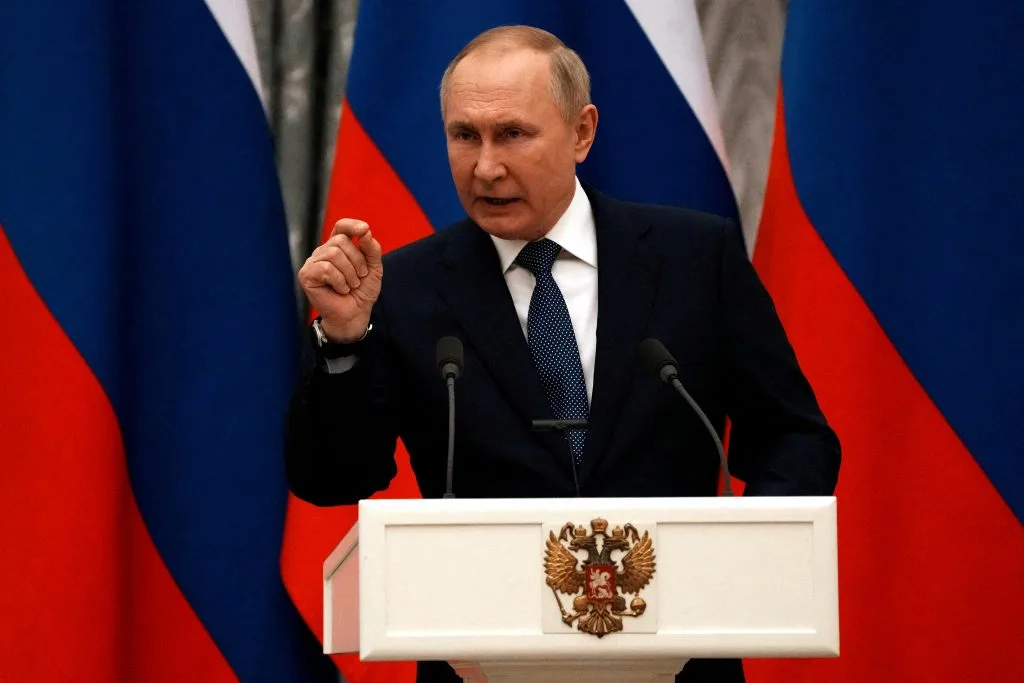
How have other nations responded?
NATO
The North Atlantic Treaty Organization (NATO) Secretary General Jens Stoltenberg has publicly condemned Russia’s “reckless” attack on Ukraine, warning that it puts “countless civilian lives” at risk.
“This is a grave breach of international law, and a serious threat to Euro-Atlantic security,” he said in a statement on Thursday. “Once again, despite our repeated warnings and tireless efforts to engage in diplomacy, Russia has chosen the path of aggression against a sovereign and independent country.”
The United Kingdom
In a televised statement, UK Prime Minister Boris Johnson also condemned Russia’s “hideous and barbaric” attack on Ukraine and vowed to join allies in launching a “massive package” of sanctions designed to “hobble” the Russian economy.
Britain then froze the U.K. assets of five Russian banks and three Russian oligarchs with close ties to Putin, but the sanctions were quickly criticised by many for being weak.
Johnson has also chaired an emergency meeting with Ukraine President Volodymyr Zelenskyy and other cabinet ministers, while Britain’s Foreign Minister Liz Truss has summoned the Russian ambassador in London for crisis talks.
The United States
President Joe Biden has also issued sanctions on Russia, calling its actions a “flagrant violation of international law.”
According to Biden, the first round of sanctions will target two financial institutions, Russian sovereign debt and Russian elites and their family members. The Pentagon also announced that it was sending more fighter jets, attack helicopters and infantry to Eastern Europe (per The Washington Post).
Germany
German Chancellor Olaf Scholz said there was “no justification” for Russia’s military actions in Ukraine.
In a statement, the German Foreign Ministry said that it had “prepared for these events” and will be working with Group of Seven powers, NATO and the E.U. to coordinate sanctions and strengthen security measures.
France
French President Emmanuel Macron addressed the nation in a televised statement where he vowed to back sanctions against Russia, saying that Russia’s attack on Ukraine amounts to the “most serious damage to peace and stability” Europe has faced in decades.
China
While many are concerned about China’s potential involvement in the matter, they have appeared to deny backing Russia’s assault on the Ukraine. While it has recognised Russia’s security concerns, China have not outwardly endorsed the actions of the Kremlin at this stage.
At a recent news briefing, Chinese Foreign Ministry spokesperson Hua Chunying downplayed the suggestion that Beijing was supporting Moscow behind the scenes.
“We won’t be like America and provide Ukraine a large amount of military equipment,” she said.
“Russia as a powerful nation also does not need China or other countries to provide military assistance. China did not wish to see what happened in Ukraine today.”
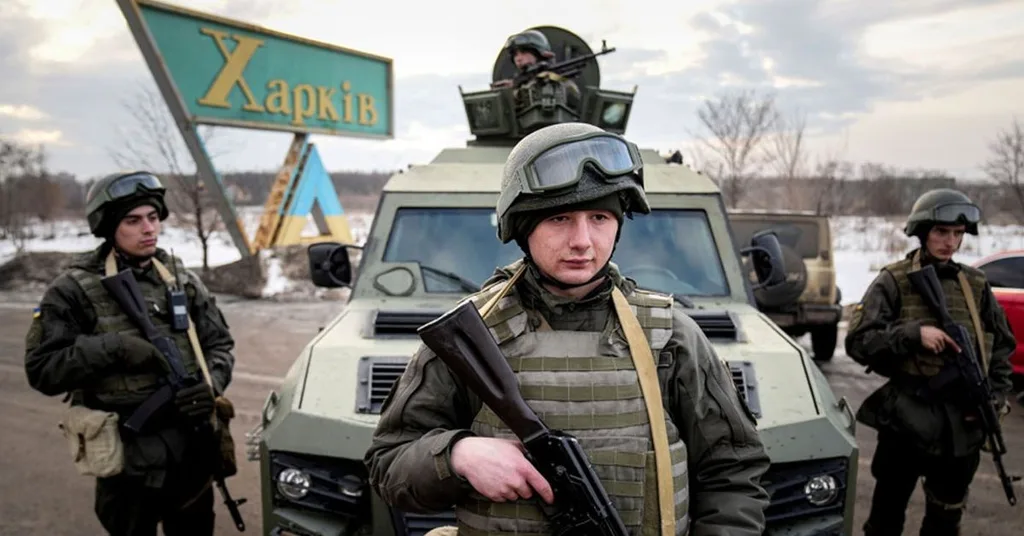
How did the conflict between Russia and Ukraine start?
Tensions have been rising between Russia and Ukraine for some time now, since Russia seized the opportunity of political turmoil to establish military control over Ukraine’s southern Crimean peninsula in 2014. Russia then held a referendum in Crimea, where voters were asked whether the disputed territory should officially become part of the country of Russia. Despite 95% of citizens voting in favour of joining Russia (and the Crimean Parliament declaring independence from Ukraine), the referendum is not legally recognised by the international community. Ukraine and the rest of the world still consider Crimea to be Ukrainian territory under law.
The current situation began to spiral in early 2021 when Ukrainian President Zelenskyy urged US President Joe Biden to let Ukraine join NATO.
This move deeply angered Russia, which began sending troops to the Ukraine border for alleged “training exercises.” By December 2021, the US became disgruntled with the deployment of Russian troops, with President Biden warning of severe sanctions should Russia invade Ukraine.
Russia then demanded that the West give a legally binding contract that NATO will not hold any military activity in Eastern Europe and Ukraine. Come January 2022, Biden assured Zelenskyy that the US would “respond decisively” if Russia invaded Ukraine. Later that month, US and Russian officials met in Geneva for diplomatic talks, but could not reach an agreement; Russia repeated security demands that the US said it cannot accept.
In late January, Biden warned of a likely Russian invasion of the Ukraine. China appeared to back Russia, telling the US that Moscow’s “legitimate security concerns” should be “taken seriously”.
The US and Russia then spared over the Ukraine crisis during a closed session of the UN Security Council, and later in February, Putin complained to Biden that the US and NATO have not responded satisfactorily to Russian demands that Ukraine be prohibited from joining the military alliance and that NATO pull back forces from Eastern Europe.
On the 24th February 2022, Russia invaded Ukraine.
How can Australians help?
It seems impossible, but there are a number of ways Australians can help the people of Ukraine, including by supporting local and international charities.
- Ukraine Crisis Appeal – The Australian Federation of Ukrainian Organisations has been encouraging people to make donations which provides humanitarian aid which provides essential include items and services including food, clean water, blankets, emergency housing, clothing and medical assistance.
- United Help Ukraine – this helps provide medical supplies and humanitarian aid, as well as raising awareness of the conflict
- Sunflower of Peace — this helps paramedics and doctors on the ground, as well as mobilize support and aid for Ukrainian orphans and internally displaced people.
- Vostok-SOS – this charity provides assistance to victims of war in both Ukraine and Crimea, finding shelter and delivering psychological first aid.
- Voices of Children – this charity aims to help children affected by the war by providing support through psychologists, video storytelling and art therapy.
- Red Cross — the International Committee of the Red Cross delivers urgent assistance (food, fuel for heating, medical supplies, and support for housing) to people in Ukraine living close to the line of contact.
- UNICEF – with teams on the ground, this children’s organisation has been bringing in clean water to conflict-affected areas and providing emergency health, hygiene and education supplies. It also provides psychological care to children experiencing trauma.
